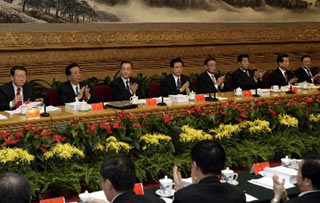China
Election procedures set for CPC national congress personnel reshuffle
Source: Xinhuanet | 10-18-2007 08:21
Special Report: 17th CPC National Congress |
Hu Jintao(C) presides over the second meeting of presidium of the 17th National Congress of the Communist Party of China (CPC) at the Great Hall of the People in Beijing, capital of China, Oct. 17, 2007. The seven-day 17th CPC National Congress opened in Beijing on Oct. 15. (Xinhua/Lan Hongguang)
BEIJING, Oct. 17 (Xinhua) -- The 17th National Congress of the Communist Party of China will first hold a primary election before a final ballot to choose members of a new CPC central committee and its discipline commission, the presidium of the congress decided here Wednesday.
The 237-member presidium to oversee the congress held its second meeting at the Great Hall of the People Wednesday afternoon, and adopted the electoral procedure that has been in practice since the 13th party congress in 1987, Xinhua was informed.
The presidium meeting, presided over by Hu Jintao, endorsed a proposed name-list of nominees for the candidates of members and alternate members of the central committee, and members of the central discipline commission. The name-list will be submitted to all delegations to the congress for consideration.
A name-list of ballot scrutineers was also accepted by the presidium, and will be ratified by the congress before the final vote begins.
Zeng Qinghong, secretary-general of the congress, briefed the presidium on the name-list of nominees.
In addition, the presidium adopted draft resolutions on the report made by Hu Jintao on behalf of the 16th CPC Central Committee, the report of the Central Discipline Commission and amendments to the party constitution. The resolutions are to be submitted to delegates for consideration.
The presidium represents people of different aspects, consisting of members of the Political Bureau of the 16th CPC Central Committee, retired party veterans, leading officials of ministries and provincial-level localities, military officers and grassroots party members.
Among the presidium are 29-year-old table tennis Olympic champion Wang Nan, China's first astronaut in space Yang Liwei, outstanding female judge Song Yushui, and "National Model Worker" bridge crane-driver Xu Zhenchao.
The personnel reshuffle is one of the most important agenda of party congress. The CPC party constitution rules that all elections should be carried out through secret ballot.
The primary election system was first introduced into party congress in 1956 when the 8th national party congress was held. Then at the 13th national congress in 1987, the differential voting system was adopted.
At that congress, five percent of nominees lost in the primary election for candidates of members of central committee, and 12 percent of nominees lost in the election for candidates of alternate members.
The margin of elimination in the vote of the 14th and 15th national congresses were not released. The 16th party congress, however, recorded a margin of elimination at a little more than five percent.
At the 16th party congress in 2002, members of the central committee were elected with a 5.1 percent margin, and alternate members of the central committee, 5.7 percent. Seven people lost in the primary vote for members of the Central Discipline Commission, marking a 5.8 percent margin.
Ye Duchu, a senior party expert with the Central Party School, said he expected the margin of elimination this year to remain similar to that of the 15th and 16th party congresses, although some others have speculated that the margin this time may be higher.
"The 15th and 16th party congresses adopted a margin of around five percent, and I think the 17th congress will follow suit," Ye said.
Hu Jintao said in his report to the congress that the party should "expand intra-party democracy."
"We will reform the intra-Party electoral system and improve the system for nominating candidates and electoral methods," he said in the report.
In choosing delegates prior to the congress, all 38 constituencies adopted a 15 percent margin in the elections, five percentage points higher than that in 2002.
Who would become top party leaders of China will not be known until next Tuesday, when the newly-elected members of the Standing Committee of the Political Bureau of the CPC Central Committee meet with the press.
Editor:Zhang Ning



